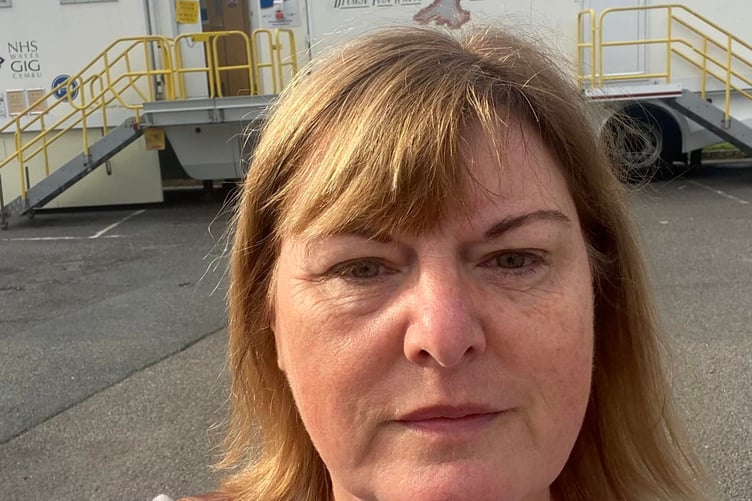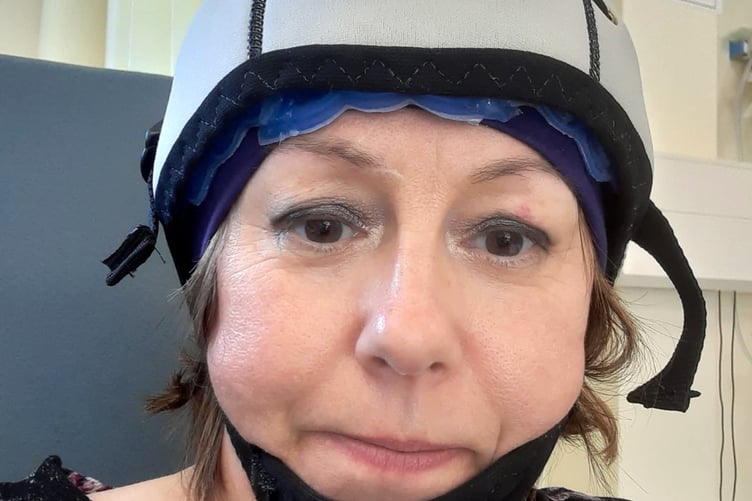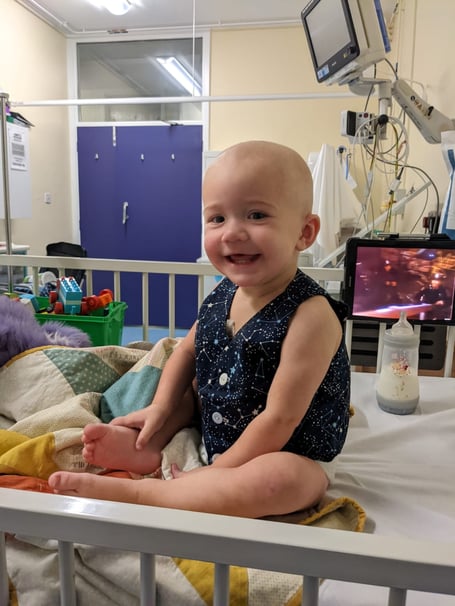Record-breaking long wait times to start cancer treatment in Wales have been branded “heartbreaking” by Macmillan Cancer Support.
Patients say their lives have been put “on hold” whilst enduring the “agonising wait” for cancer treatment.
Julie Grabham, proud businesswoman and mother from Lampeter, Ceredigion, said: “I didn’t just get breast cancer, I got anxiety.
“You’re out of control of your life. Trying to find out when my lumpectomy would be was like getting blood out of a stone.”
New figures from Macmillan show that 1,800 people would have been given the gift of time with their families if the targets for starting cancer treatment were met by NHS Wales.
Currently just one in two cancer patients are starting their treatment on time. In July 2021 NHS Wales gave themselves a target of 62 days for treatment to start, spanning from the moment cancer is suspected by a professional.

One of the people affected by the delays branded a “crisis point” by Macmillan is HR consultant Julie.
The 55-year-old said: “I was told my surgery would be scheduled within 62 days so I decided against seeking out private medical care.
“I was told I had an invasive tumour and it seemed to me no one was doing anything about it.
“It’s overwhelming to be told you have cancer- straight away your life changes. For me it changed in a different way- I thought I was going to be looked after by the NHS but I wasn’t.”
Running her own business whilst waiting for the date for her treatment was a “nightmare” telling her clients to find other consultants.
She was called in for a biopsy after her annual mammogram in September 2022, but was told she would need to wait 18 days for the results due to the only consultant being on holiday.
The grandmother to four “beautiful” granddaughters said: “I would tally every day in my journal. I chased the results myself, I couldn’t stop thinking about if the cancer was spreading to the rest of my body.
“I think I got the results sooner by chasing it- but imagine if I wasn’t confident to chase it myself.
“I know the NHS are under resourced – the people in the NHS are great but the system is rubbish. You’re a patient not a person once you’re diagnosed.”
Along with the impact on her physical and mental health and work, she said the wait to start treatment had a huge impact on her family.
According to the new research from Macmillan, 1,800 patients would be given six months or more if they had commenced their cancer treatment within the 62 day window from when cancer was first suspected.
Julie’s treatment was 38 days outside of that window. She said: “I feel frustrated with my cancer journey. It feels like I’ve had to project manage my own healthcare.
“The anxiety has affected my whole family. My parents are still around, and I spend a lot of time reassuring everyone else that I’m going to be OK.
“But I don’t know that if I don’t know when my treatment is going to start. It’s mentally exhausting.”
Julie is now recovering and campaigning for employers to commit to paying employees for time off to attend breast cancer screenings.
But despite Julie’s success story, cancer wait times were branded ‘the worst since records began’ in August 2022.
One in four cancer patients have been impacted by delays in treatment over the last 10 years, with the pandemic causing even more significant delays in treatment times.
No health board in Wales has met the current target for 75 per cent of cancer patients to be treated within 62 days.
Another patient impacted by the severe wait times to start treatment is Sarah (not her real name) from Powys, who waited over 90 days for her hysterectomy to treat her endometrial cancer in June 2022.
Sarah, mum to one and grandmother to three grandchildren, said: “I arrived in A and E in agony- it turns out it was the lining of my womb fusing to my bowel. I had to push my fist into my side to relieve the pain.
“I was failed by my GP. My gynaecologist was horrified things hadn’t been taken seriously sooner.”
The landowner in her sixties was struggling with post-menopausal bleeding in November 2021 when she first brought it to the attention of her GP.
It wasn’t until February 2022 when she arrived in A and E that it was taken seriously and a gynaecologist first suspected cancer.
She had already prematurely lost her sister to cancer at 50 and her mum to cancer at 58. She said: “I was devastated. It was history repeating itself. I was trying to convince myself the symptoms were something else.
“When you’re told you have cancer, you get that feeling - ‘I want it out of my body as soon as possible.’”
By the time she arrived in A and E the cancer had already spread to her lymph nodes. Several had to be removed during her full hysterectomy, which was over three months later in June 2022.
Both Sarah and Julie had the option to seek private medical care- but were told by the NHS they would be treated within two months, so didn’t.
Sarah added: “I felt lucky my treatment didn’t start any later, get cancelled or delayed. I’ve heard of many cancer patients’ treatment getting postponed.
“My gynaecologist, my treatment at A&E in Bronglais Hospital and the staff were glorious. A and E is full because of the failings of doctor’s surgeries not picking up cancer diagnoses like mine when they should.”
Macmillan’s research shows that more people are getting referred for cancer treatment than ever before, but that the number of people experiencing delays for treatment is growing even faster.
According to data from a June 2023 Senedd Research report, only 55.3 per cent of patient treatment pathways, 974 out of 1,761, started within 62 days. The current 2023 target for 70 per cent of patients to get treated within 62 days seems far off.
The report stated: “At the current rate of progress... the target to eliminate one year waits in most specialties will not be met until after January 2024.”
Richard Pugh, head of partnerships for Macmillan Cancer Support in Wales said: “The situation for people with cancer is heartbreaking.
“Staff across Wales’ health systems are working tirelessly but are at breaking point.
“The failure of governmental support across Wales and the UK has left health services fractured and people living with cancer are left paying the price.”
However, delays aren’t the only story. Ren Skalka from Llanon, Ceredigion, had the horror of watching her baby girl Tabby be diagnosed with liver cancer at only 16 months old.
But Tabby was diagnosed one fateful Friday in October 2021, and by the following Monday she was starting treatment.
Ren fears the pandemic resulted in Tabby’s health issues not being noticed by health professionals sooner.
Ren, 41, a mum of two and administrator for West Wales Domestic Abuse Service, said: “I fainted when I found out. The stress we were under was making my five-year-old daughter throw up.
“We wished we’d pushed the issues sooner. She was a lockdown baby, so she only had one health visit in person after she was born.”
Tabby had missed all her developmental milestones but then one day she stopped eating. By that time her belly was swollen from the tumours in her liver.
Ren said: “The GP took one look at her and sent her straight to Bronglais hospital. The consultant was positive and within two days of being put on the transplant list she had a new liver.
“Bronglais and all the hospitals involved were amazing- we’re really lucky we found Tabby’s cancer when we did.
“Given how quickly some cancers can spread, even cancers at early stages need to be addressed quickly- it’s horrifying to think about the delays.
“The problem for us was travelling to Cardiff hospital so often when neither me nor my wife drove- there’s no provision for specialist cancer treatment in west Wales.”
Welsh Cancer Intelligence and Surveillance Unit found the number of cancer cases diagnosed by NHS Wales dropped by 14.2 per cent in 2020 due to the pandemic compared to 2019.
Between April and December 2020, 3,089 fewer cases were diagnosed compared to the average pre-pandemic.
Macmillan is now calling for the Welsh government to ensure cancer care has adequate provision, so another 3,000 patients don’t fall through the cracks left by the pandemic.
Macmillan’s Richard Pugh said: “Politicians, what are you waiting for? You have pledged to treat 80 per cent of people with cancer on time by 2026, yet right now Wales is consistently leaving almost half, or one in two people with cancer to face devasting delays in their care.
“To make that 80 per cent ambition a reality rather than a cruel fiction, we need to see sustainable funding put in place for investment into the cancer workforce.
“By investing in this, you are investing in the future of people living with cancer – you are investing in giving people with cancer those vital extra days, weeks and months with their loved ones.”
Yet for some treated for cancer during the pandemic, they feel their treatment was never quite finished.

For fear of not being able to access any surgical treatment at all during the pandemic, Eirian went ahead with the emergency mastectomy on 26 March.
The surgery was 87 days after the cancer was suspected by her GP, 25 days over NHS Wales’ treatment target.
The unprecedented times meant her surgery was given without the offer of breast reconstruction during the same procedure, usually offered as standard.
Now, four years later, she’s still waiting for that offer to be fulfilled.
She said: “I wasn’t given an option about what to do with my body- the choice was taken away from me. Last time I checked, I wasn’t even on the waiting list for reconstruction.
“I know they saved my life and I’m eternally grateful. I’m not saying I should be given priority of people who have cancer now, but I feel like I’m on the bottom of a waiting list that’s forever getting longer.
“It’s impacted my relationship with my body massively. I had reached a place where I was proud of my body. It sounds really petty, but I see women out wearing beautiful dresses knowing I can’t wear those anymore. My confidence is gone.”
In response to Macmillan’s data, a Welsh Government spokesperson said: “Access to cancer treatment is a priority and clinical teams and managers across the NHS in Wales are working hard to improve cancer performances.
“We are seeing year-on-year increases in demand for cancer investigation and we are investing heavily in cancer services to improve diagnosis and provide rapid access to high-quality care.
“We have launched a national intervention to support recovery in waiting times for cancers with the lowest cancer performance.”




